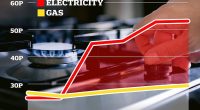
The best headline savings rates on the market are paid by regular saver deals, but people are turning their backs on the products and taking out bonds instead.
Regular saver accounts encourage customers to put a fixed amount aside every month, and interest is normally paid after one year.
Nationwide’s newest regular saver pays 8 per cent, First Direct’s longstanding deal pays 7 per cent and Lloyds Bank 6.25 per cent – though the way the interest is calculated is complicated and means savers may not get quite as much as they think.

Take your pick: Savers seem to be choosing long-term certainty over high headline rates
Despite these seemingly unbeatable rates there is actually less cash held in regular savers now than a year ago, according to analysis of Caci data by Paragon Bank.
Britons held £20.7billion in regular savers by the end of August 2023, compared to £21.1billion in the same period in 2022.
In comparison, there is a massive £528.1billion in easy access accounts, £258billion in fixed-term deals such as bonds and £118billion in National Savings and Investments (NS&I) Premium Bonds.
Despite banks heavily promoting regular savers, the biggest savings trend over the past year has been for consumers to take out fixed-term deals, Paragon Bank said.
Savers now hold £258billion in fixed-term deals, up from £130billion at the same point last year and a 98 per cent increase.
Fixed-rate Isa balances rose from £76.5billion to £138.8billion over the 12 months, an 81.5 per cent rise.
The best fixed-rate bond, from NS&I, pays 6.2 per cent interest a year, and the best fixed-rate cash Isa, from Shawbrook, pays 5.83 per cent.
But despite these lower rates it seems savers are flocking to fixed-term deals and sidelining regular savers.
Paragon Bank director of savings, Derek Sprawling said: ‘The shift in the savings market over the past 12 months has been unprecedented.
‘We have never experienced the amount of switching to fixed-rate variants and new account openings before, particularly in the Isa segment of the market.
‘To record a 98 per cent increase in fixed-rate balances overall, and a more than doubling of the amount held in non-Isa fixed-rate variants, will have changed savings habits for years to come.
‘Our experience shows that if savers hold money in a fixed-rate account, that money will typically switch to a new fixed-term on maturity.’
Why don’t customers want regular savers?
Regular saver deals, despite their current high rates, have historically been a niche savings deal.
The products normally cap how much consumers can save at less than £500 a month, and sometimes as little as £150. Any withdrawals within the one-year term tend to mean losing the interest altogether.
In uncertain economic times, the certainty of a guaranteed level of interest from a fixed-rate deal such as a bond or Isa may also appeal, paired with the feeling that savings rates might start to drop if the Bank of England cuts base rate.
Base rate, which the Bank of England held at 5.25 per cent last month, is factored in to the savings rates people get.
Another reason that consumers are turning away from regular savers may be that the interest rates on these deals are not all that they first appear.
For example, the top interest rate in the UK, from Nationwide’s regular saver, lets customers pay in up to £200 a month, totalling £2,400 a year.
Putting £2,400 in an easy access account paying 8 per cent a year would mean interest of £192.
But the maximum a saver could earn from the Nationwide deal is £104 – meaning an underlying rate closer to 4.25 per cent, rather than 8 per cent.
The reason is the unique way interest is worked out on regular savers, where savers only get the headline rate for one month of the year, and get a fraction of it for the remaining 11.









